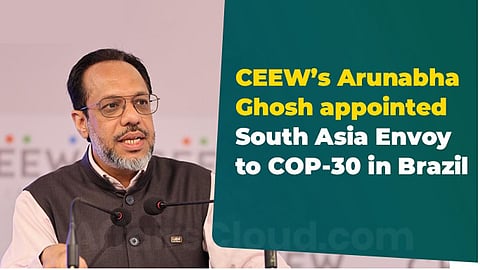

New Delhi | With just over a month to go for COP30 in Brazil's Belem, the focus must decisively move from making pledges to implementing them and this year's summit must become COP for implementation, said Arunabha Ghosh, Special Envoy for COP30 representing South Asia.
He warned that if the global climate regime continues to function as a "bank of commitments" without tangible results, there could soon be "a run on the climate architecture bank." Speaking at an event marking a decade since the Paris Agreement, Ghosh, CEO of the Council on Energy, Environment and Water (CEEW), said the upcoming COP30 must become a "COP for implementation".
"There is only that much value to saying things which are not delivered," he said, urging countries to submit not just commitments but demonstrable actions.
"Any deposit that does not yield any interest gets devalued. When you devalue a bank's deposits, there is a run on the bank. My fear is there will be a run on the climate architecture bank that we have today if we only keep submitting deposits," Ghosh cautioned.
Reflecting on the decade since the Paris Agreement, he noted that while the world had achieved tangible outcomes such as the finalization of the Paris Rulebook and the creation of the Loss and Damage Fund these advances were offset by an "implementation gap" and a widening "ambition gap".
"Many countries have not given sufficiently ambitious upgrades to their Nationally Determined Contributions (NDCs)," he said.
The first Global Stocktake at COP28 in Dubai had already revealed these shortcomings, he added.
Ghosh said COP30's focus on implementation "makes much more sense" given the gap between promises and delivery.
He also underlined the need to accelerate "technology innovation and diffusion cycles," noting that technological disruptions in sectors such as energy and transport are nonlinear and require faster scaling.
He highlighted that while global climate finance flows have just crossed USD 100 billion, the real requirement is "20 times that flow".
Ghosh urged leveraging digital public infrastructure to boost decarbonization finance, pointing to India's own experience in rapidly expanding financial inclusion -? "Between 2014 and 2016, 260 million new bank accounts were opened," he said.
On capacity and skills, Ghosh invoked a saying he saw at Tsinghua University in China: "It takes decades for trees to grow, but a century to nurture talents." He asked, "Do we have a century to nurture talents for a very different way of developing our economy?" He also called for a rethink of timelines and reference points in climate action, arguing that while we often measure progress in decades, nature and energy transitions evolve over longer or shorter cycles.
"Will we refer to this as the century of renewables, or the half-century of solar and wind," he asked.
Ghosh warned that political shifts -? often occurring in weeks -? could upend years of climate progress, referring to events such as the US withdrawal from the Paris Agreement and emerging threats to climate laws in the UK.
"Time is of the essence, and time is what we make of it. Whether we celebrate or commemorate a decade, it could also be a trigger for a new start," he said.
Damien Syed, Minister-Counsellor at the French Embassy in India, echoed Ghosh's call for action but stressed that the Paris Agreement remains the foundation for today's climate efforts.
"Without the Paris Agreement, our planet would have been in a worse state today," he said.
Syed recalled that at COP21, countries made a breakthrough by combining long-term ambition with flexibility, allowing each nation to set its own targets through NDCs.
"Despite all the hardships, the Paris Agreement was a success. It was adaptive and became a reference in the climate agenda," he said.
He noted that the number of countries with dedicated climate laws and strategies has risen from 98 to 164 since 2015, while annual investments in the energy transition are projected to hit USD 2.2 trillion in 2025 which is double that of fossil fuels.
"Our global energy landscape is decarbonizing at unprecedented speed," he said, adding that France and the EU are on track to meet their 2030 targets and achieve carbon neutrality by 2050.
Syed also emphasized that COP30 must build on science and diplomacy.
"Science is clear '? a 42 per cent cut in global emissions by 2030 relative to 2019 is needed if we are to stay within 1.5 °C warming," he said.
expressed confidence that "if science and diplomacy are combined", COP30 could be as successful as COP21.
Former foreign secretary Shyam Saran, who served as India's Special Envoy for Climate Change, took a historical view of the negotiations, tracing the journey from the 1992 Rio Convention to the Paris Agreement.
He warned that the global process has seen "a consistent attrition" of the principles of equity and differentiated responsibility that once underpinned the UN Framework Convention on Climate Change (UNFCCC).
"The caricature that developing countries want the right to spew as much carbon as they want is false," he said, recalling that India and other developing nations had agreed to act within their resources but needed a "supportive global regime".
Saran pointed out that the Kyoto Protocol was "a legally enforceable instrument," unlike the voluntary NDCs of today.
"Countries like Japan, Australia, and Canada simply walked away from their targets, and there were no consequences," he said.
Comparing that period to the present, he said that there is now little linkage between the support promised to developing countries and their ability to deliver on mitigation targets.
